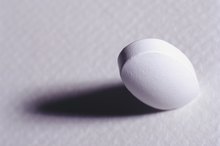What Happens if You Consume Too Many Minerals?
The minerals you get from your diet help to maintain normal body function. However, your body does not require large stores of minerals. You can get the proper amounts of most minerals from the foods you eat. This makes supplements often unnecessary and, if you get too much of any one mineral, supplements can be dangerous. For this reason, it is important to discuss any mineral supplements you are considering with your doctor.
Sodium
High blood pressure contributes to nearly 400,000 deaths in the U.S. each year and, according to the Centers for Disease Control and Prevention, sodium is largely to blame. Each day you should consume no more than 1,500 milligrams of sodium to remain healthy. However, the CDC reports that most Americans, over the age of 2, consume 3,436 milligrams each day. This high consumption of sodium can cause high blood pressure that may lead to other conditions, such as heart disease. To reduce your sodium intake, MayoClinic.com suggests checking your food labels to find foods with less than 35 milligrams of sodium per serving.
Iron
Chelated Zinc Side Effects
Learn More
Iron is stored in many of your organs and is excreted rarely. This makes iron toxicity a concern. Toxicity can cause digestive upset, organ failure and death, in extreme cases. To avoid iron toxicity, consume no more than 45 milligrams of iron a day. Chicken liver and fortified cereals have the largest doses of iron. Meat sources of iron are more readily absorbed and therefore are more likely to cause toxicity. If liver is your favorite food, consider having your iron levels tested as a precaution.
Zinc
Zinc overdose can cause nausea, headache and fatigue. Extremely high amounts of zinc have also been linked to anemia, low immune function and an increased chance of urinary tract infections. The National Institutes of Health suggests keeping your intake of zinc below 40 milligrams a day, between food and supplement sources. Zinc is in many of the meats, seafood, nuts and eggs you eat. Because zinc is in so many common foods, it is important to use zinc supplements under a physician’s watch to prevent an overdose.
Selenium
Copper Supplements Side Effects
Learn More
Your body requires very little selenium to remain healthy: 55 micrograms a day. Selenium creates antioxidant enzymes in your body, which help protect your cells against damage, making it potentially beneficial in preventing some cancers, according to MedlinePlus. However, too much selenium can lead to a condition called selenosis. As a result, you may experience hair loss, fatigue, slight nerve damage and nausea. Selenium is found in the greatest supply in meats of animals that were fed a plant diet. It is also in eggs, garlic and grains.
Related Articles
References
Writer Bio
Heather Rutherford has enjoyed writing professionally since 2004. Her articles have appeared in ModernMom.com, DailyLife.com, ParentsHut.com, Trails.com and On-the-News. She also works intimately with several small businesses to prepare business plans and other marketing materials. Rutherford is seeking an Associate of Arts in business from North Idaho College.









